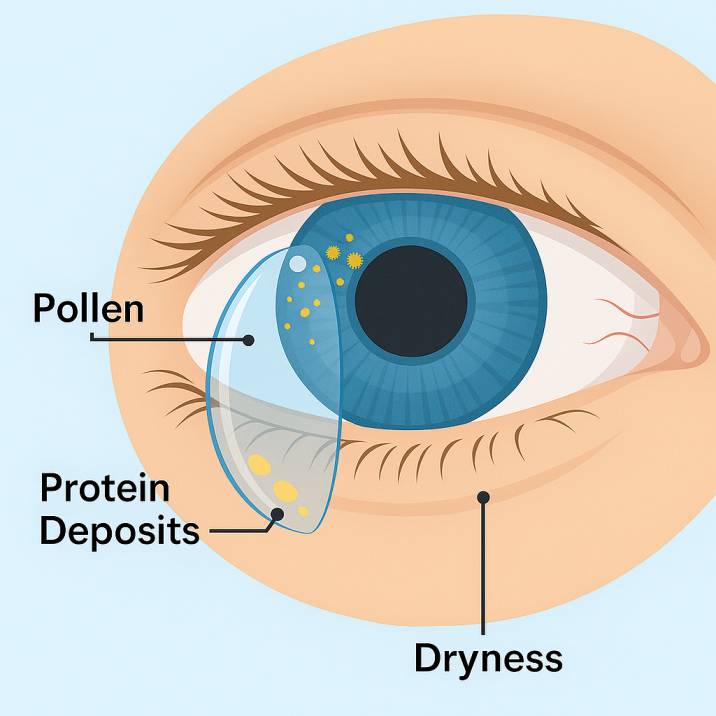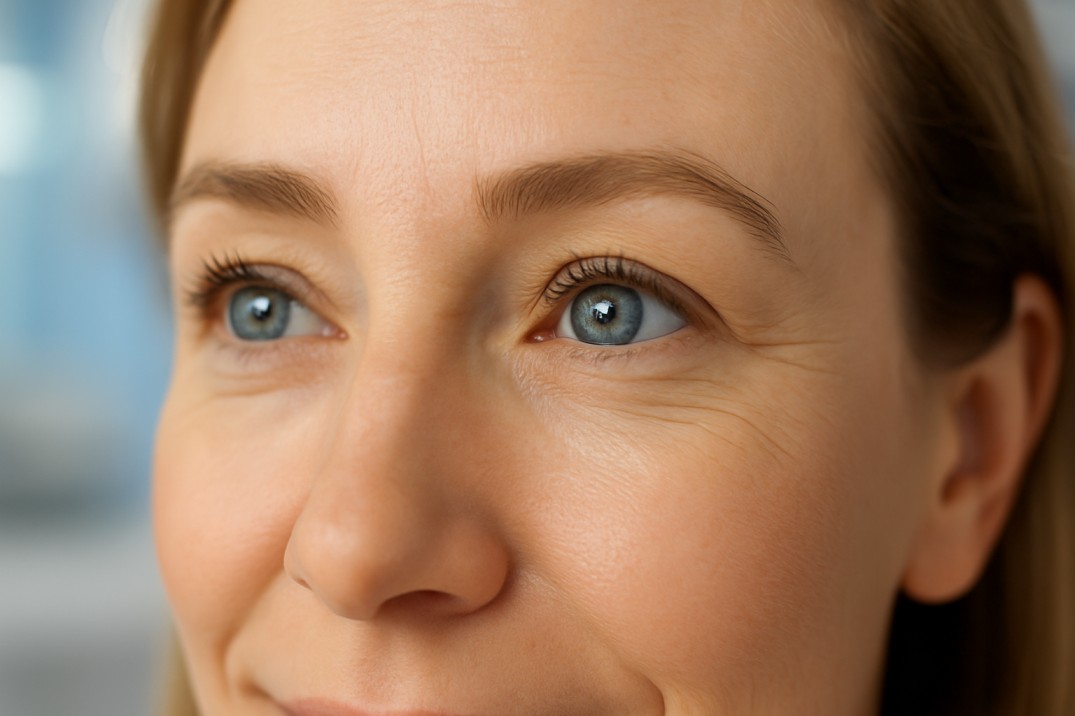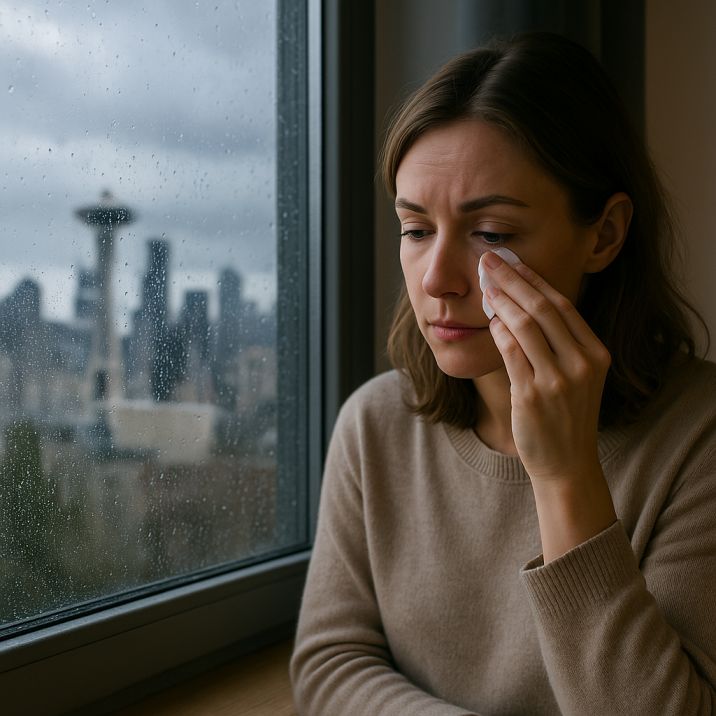Itchy Eyes and Contact Lenses: What to Do When the Itch Won’t Stop
Key Takeaways: Managing Itchy Eyes with Contacts in Seattle
-
Seattle’s environment plays a major role in contact lens discomfort—pollen, mold, and dry indoor air are frequent triggers.
-
Seasonal allergies and dry eye syndrome are leading causes of itchy eyes, especially during spring, fall, and rainy months.
-
Reusable lenses may worsen symptoms due to protein deposits—daily disposables offer cleaner, more comfortable wear.
-
Improper hygiene habits like sleeping in lenses or not cleaning lens cases regularly can trap irritants and bacteria.
-
Underlying conditions (like blepharitis or GPC) may require medical treatment—persistent itching isn’t always allergy-related.
-
Switching to allergy-specific solutions and lenses, including antihistamine-releasing contacts, can significantly reduce symptoms.
-
Use the 20-20-20 rule and indoor humidifiers to combat screen-induced dry eye during Seattle’s overcast days.
-
Seek professional care immediately for red flags like pain, vision changes, or discharge—these may indicate infections.
-
Cannon EyeCare recommends high-oxygen daily lenses, preservative-free drops, and lid hygiene products for lasting comfort.
What Causes Itchy Eyes With Contact Lenses in Seattle?
Itchy eyes while wearing contacts often stem from Seattle’s unique environment, lens care habits, or eye health conditions. Key triggers include pollen, mold spores, dry indoor air, and improper hygiene.
Top Causes at Cannon EyeCare in Seattle, WA:
-
Seattle Seasonal Allergies
Tree/grass pollen peaks during spring and fall. Allergens cling to lenses, causing persistent irritation. -
Dry Eye Syndrome
Indoor heating during damp winters reduces moisture, intensifying contact lens discomfort. -
Lens Protein Deposits
Reusable lenses accumulate cloudy buildup that irritates eyes and blurs vision. -
Poor Hygiene Habits
Sleeping in lenses or infrequent cleaning traps bacteria and allergens. -
Underlying Eye Conditions
Blepharitis, GPC, or allergic conjunctivitis often triggers severe itching. -
Solution Sensitivities
Some patients react to multipurpose solutions; ask our Seattle optometrists about preservative-free alternatives.
How Seattle’s Allergy Season Worsens Contact Lens Discomfort
For Seattle contact lens wearers, pollen and mold turn lenses into irritant magnets. Discomfort spikes when:
-
Tree/grass pollen peaks (March–June & September–October)
-
Mold counts surge during rainy months
Key Symptoms at Cannon EyeCare in Seattle, WA:
-
Persistent itching/redness despite proper hygiene
-
Watering or burning sensations
-
Lenses feeling gritty or shifting excessively
Science-Backed Solution:
A landmark 2024 study revealed that allergy sufferers using antihistamine-releasing contact lenses experienced:
- 40% fewer symptoms
- Reduced the need for allergy eye drops
Seattle-Specific Relief Strategies:
-
Switch to daily disposables during peak pollen seasons
-
Use preservative-free rewetting drops for mold-related dryness
-
Ask our Seattle optometrists about next-gen anti-allergy lenses
Is Seattle’s Climate Worsening Your Contact Lens Dry Eye?
Rainy days mean more screen time—and less blinking. This combo, paired with indoor heating in cooler months, fuels evaporative dry eye for Seattle lens wearers.
Dry Eye Symptoms at Cannon EyeCare in Seattle, WA:
- Itching with burning/”gritty” sensations
- Shortened comfortable lens wear (removing after 2–4 hours)
- Vision blurring that improves with blinking or artificial tears
Science-Backed Relief:
Recent clinical trials show daily disposable lenses (e.g., delefilcon A) offer:
- 32% reduction in end-of-day dryness (2024 Eye & Contact Lens study)
- Less itching for sensitive wearers
Seattle-Specific Solutions:
- Use humidity monitors to combat indoor drying (ideal: 40–60%)
- Practice the “20-20-20 rule” during screen use: Every 20 minutes, look 20 feet away for 20 seconds
Diagnosing Contact Lens Discomfort: When to Visit Cannon EyeCare in Seattle, WA
Pinpointing the cause of lens-related itch requires evaluating hygiene, fit, allergies, or underlying issues. Start with this self-check:
Self-Assessment Checklist:
- Cleaning lenses/case daily?
- Replacing lenses on schedule?
- Symptoms worsening during Seattle’s pollen peaks?
- Using the same solution brand consistently?
- Waking with crusting/discharge?
Urgent Symptoms Needing Professional Care:
Seek immediate evaluation at our Seattle clinic for:
-
Severe pain, vision changes, or intense redness
-
Yellow/green discharge, swelling, or light sensitivity
-
Itch persists after lens removal and lubricant use
Step-by-Step Relief for Itchy Contact Lens Eyes in Seattle
Combat lens-related discomfort with these actionable strategies from Cannon EyeCare:
Immediate Relief Tactics
-
Remove lenses and inspect for debris or deposits
-
Rinse eyes with preservative-free saline (if recommended)
-
Apply a cold compress to closed eyelids for 5 minutes to calm histamine reactions
-
Use rewetting drops formulated for contact lenses—never “whitening” redness drops
Long-Term Solutions for Seattle Wearers
-
Switch to daily disposable lenses to minimize allergen buildup
-
Ask our Seattle optometrists about antihistamine-releasing lenses—proven in recent studies to reduce itching
-
Deep-clean lens cases weekly; air-dry and replace every 3 months
-
Avoid eye rubbing to prevent inflammation and bacterial transfer
Best Eye Care Products for Seattle Contact Lens Wearers
Choosing the right solutions and lenses is crucial for comfort in Seattle’s allergy-prone climate. Cannon EyeCare recommends these clinically trusted options:
Safe Eye Drop Types
-
Rewetting drops: Use with lenses (e.g., Opti-Free Puremoist, Blink Contacts)
-
Preservative-free artificial tears: Apply before inserting or after removing lenses
-
Prescription anti-allergy drops: For severe reactions—always consult our Seattle optometrists before pairing with contacts
Top Vetted Products for Seattle Patients
-
-
Dailies Total1 (high oxygen permeability)
-
Acuvue Oasys 1-Day with HydraLuxe™ (allergy season comfort)
-
-
Allergy-specific lenses:
-
Next-gen antihistamine-infused options—ask Cannon EyeCare about the latest releases
-
-
Eyelid hygiene:
-
Hypochlorous acid foams/wipes for blepharitis-prone wearers
-
If you’re dealing with itchy eyes while wearing contact lenses in Seattle, you’re not alone—and you don’t have to suffer through it. From seasonal allergies and dry indoor air to lens buildup and solution sensitivities, multiple factors may be to blame. Thankfully, modern solutions like daily disposables, antihistamine-releasing lenses, and personalized treatment plans can provide lasting relief.
Ready for clear, comfortable vision again?
Schedule your personalized contact lens consultation at Cannon EyeCare in Seattle today. Our expert team will pinpoint the cause of your discomfort and recommend the best path forward—so you can enjoy every season without the itch.
Call now or book online—your eyes will thank you!
FAQs
-
Dryness, allergies, lens deposits, poor hygiene, or ill-fitting lenses can trigger itchiness. Consult an eye care professional if symptoms persist




